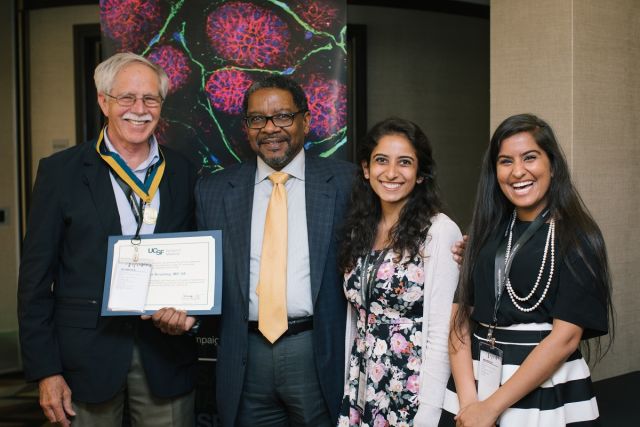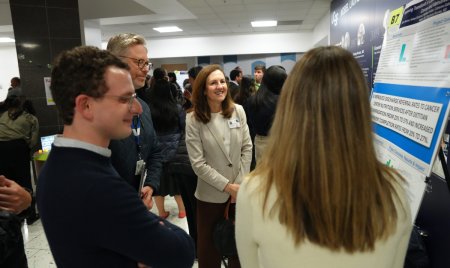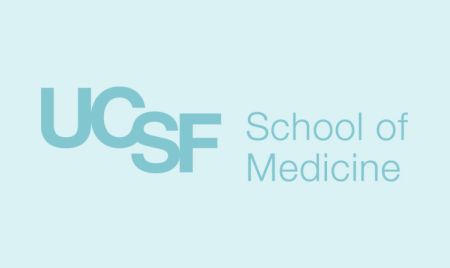Class of 1968 Celebrates Fiftieth Reunion and Shares Wisdom with First-year Medical Students

2018 Alumni weekend at UCSF
On June 1, the UCSF School of Medicine Class of 1968 celebrated its 50th anniversary of their graduation from medical school. Talmadge E. King, Jr., MD, Dean of the UCSF School of Medicine, hosted the ceremony at the Hyatt Regency hotel in downtown San Francisco.
“UCSF is a special institution because people like you pass through it. We have made huge progress because of the foundation you set for future classes,” said Dr. King.
This progress is reflected in the diversity of the school’s graduates: more women and more students from diverse ethnicities and socioeconomic backgrounds.
Of the 127 graduates in the class of 1968, 16 were women—a considerable number for the time period, though much fewer than this year’s entering class.
“When I applied to dermatology residencies, some directors told me I wasn’t eligible because I had two kids,” Janet Roberts, MD, class of 1968, told me. “Now, that’s unthinkable!"
“Many of these women had to go through so much we won’t have to experience. There is so much more work to be done but we have come a long way,” said Smrithi Sukumar, a first-year medical student who sits on the Medical Alumni Association Board as a student representative.
Fifty-seven percent of our medical school class, the class of 2021, is women.
“That’s wonderful news,” said Laura Knight, MD, Class of 1968. After finishing her residency, Dr. Laura Knight worked at the University of Minnesota for nine years, eventually earning tenure.
I noticed that both Dr. Knight and Dr. Roberts had married classmates. “This journalist has confirmed seven couples in my medical school class,” I said. “What advice do you have for us?”
“Well of course, you are both equal. Help each other. Listen!” said Dr. Knight. She paused. “Respect!” I wrote that down.
As I searched for another friendly face to interview, I was drawn to the shoulder-length hair and green beret of Stephen Young, MD, whose visage matched all the images I held of 1960s San Francisco.
What did Dr. Young think about the School of Medicine’s new Bridges Curriculum, which features small-group learning centered around case studies? “The only small group I had was at the bar on Judah street. A pitcher of Anchor Steam was only a dollar,” he joked. “But it sounds like an improvement from the strict lecture-based teaching during my time.”
In the Bridges Curriculum, first-year medical students spend one day weekly in “clinical microsystems,” where they learn clinical and quality improvement skills. In small-group sessions, students engage with cases designed to prepare them for clinical responsibilities. The result is a much stronger connection between the basic sciences and the applied domains of medicine.
Other alumni marveled at the scientific advances that have occurred since they graduated. “My stepfather contracted pneumonia in 1948. And the doctors said there was nothing we could do. The field of critical care or pulmonary medicine didn’t exist as it does today,” said Hugh Vincent, MD.
Since 1989, five UCSF faculty members have won the Nobel Prize. For example, Professor Shinya Yamanaka, MD, PhD shared the 2012 prize for transforming ordinary adult cells into pluripotent stem cells and Professor Emeritus Elizabeth Blackburn, PhD, shared the 2009 prize for discovering telomerase, an enzyme that plays a key role in aging.
“UCSF is leading advances in gene therapy, artificial intelligence, and many other fields. I honestly wouldn’t mind leaving if I could just peek into the next fifty years,” said Dr. Vincent.
“Fifty years goes by so quickly,” said Byron Chong, MD class of 1968. “Enjoy it, hold onto it. I saw about thirty patients daily for almost fifty years. I performed countless surgeries to give people back their sight. Anyone who came to me, I tried my hardest to fix their problems. Multiply that effect by all the members of this class and you’ll understand the impact we had.”
He wasn’t bragging, just reflecting with a calm satisfaction that was foreign to me, a student who still wears his stethoscope backwards on occasion, a steadiness that maybe you can only earn after five decades.
In fifty-three years, if we are lucky, my classmates and I will celebrate our fiftieth graduation. Maybe then, I’ll have earned the right to reminiscence to a young medical student.
I’ll remember what the Class of 1968 told me about medicine, marriage, gender, and death. I’ll realize I didn’t quite understand what they meant then, way back in 2018, but now, after fifty-three years, I know.









